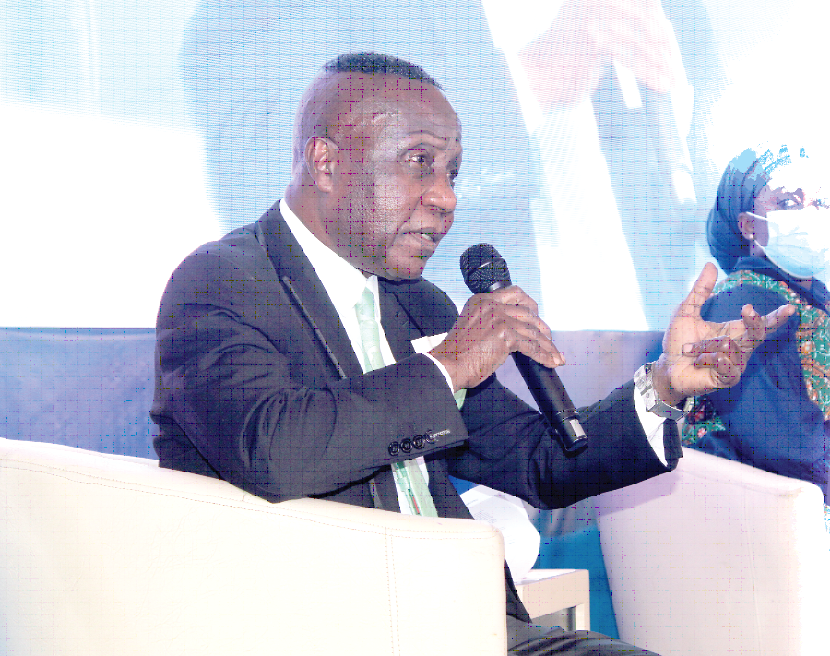
Cap borrowing — Dr Kwakye advocates new law
THE challenges facing the economy are giving rise to novel and unpopular policy prescriptions. One of them is a strong case for a law to cap how much the country can borrow in a year.
At the Graphic Business/Stanbic Bank Breakfast Meeting last Wednesday, the Director of Research at the Institute of Economic Affairs (IEA), Dr John Kwakye, said the time had come for the country to place a ceiling on how much a government can borrow.
Dr Kwakye said just like the Fiscal Responsibility Act which places a ceiling of five per cent of gross domestic product (GDP) on fiscal deficit, there should also be a similar law that would cap borrowings.
That, he said would help control the country’s rising debt, which the International Monetary Fund (IMF) and the World Bank has said was at a high risk of debt distress.
On what the ceiling should be, Dr Kwakye said there was the need to have a national conversation on how to go about it.
“The cap could be a percentage of the revenue you intend to collect in the year. We need to have a national conversation on this,” he stated.
Dr Kwakye was speaking on the theme “Living within our means: An imperative for economic success.”
Warning bells
His call comes at a time when the country’s debt of almost GH¢400 billion, equivalent to more than 78 per cent of gross domestic product (GDP) as of June.
The debt stock has already sparked investor flight, resulting in a lack of market access, increased exiting of non-resident investors and a return to the IMF for a bailout programme to help stabilise the situation.
Squeezing capital expenditure
Dr Kwakye also pointed out that increasingly, the country had been spending a lot more of its revenues on recurrent expenditure while it squeezes capital expenditure.
He said for the economy to grow sustainably, the country should be spending at least 10 to 15 per cent of GDP on capital expenditure.
“This is what will grow the economy. Our budget is consumed entirely by compensation, interest payments and transfers to government units, which are recurrent and consumption expenditures,” he stated.
He said this was the reason why the country’s roads were in a bad state.
“A country that does not have a railway system, we don’t have an airline, we don’t have a shipping line, we don’t have effective oil refinery. All this should tell you that we are not making enough capital investments and, therefore, when we talk about expenditure rationalisation, we are talking about the need to rebalance expenditure away from the recurrent nature towards more investments in capital projects,” he said.
Living within means
The Director of Research also noted that the country living within its means was an important and guiding principle which would help avoid financial crisis.
He said over the years, the country had been recording huge budget deficits which had been the root cause of the fiscal mess in which it found itself.
“This is not the first time we have been in this situation and have gone to the IMF. The fact that we have been going to the IMF for this number of times tells that we have not been practising fiscal discipline and not living within our means,” he stated.
He pointed out that the country had a long history of high fiscal deficits, which dated as far back as 2010.
He said between 2010 and 2018, Ghana’s fiscal deficit had averaged 6.6 per cent of GDP, compared to the average of 3.2 per cent for sub-Saharan Africa (SSA) for the same period.
He noted that in 2019, 2020 and 2021, the country recorded budget deficits of 7.3, 15.6 and 11.6 per cent, respectively, compared with 3.9, 6.4 and 5.3 per cent for SSA for the same periods.
“So for this entire period, 2010 to 2021, Ghana has consistently recorded much higher fiscal deficit than the other countries in the region and this is what has led to the huge public debt.
“If you look at the debt-to-GDP figures as well, Ghana’s average between 2010 and 2018 was 47 per cent, while that of SSA averaged 35 per cent,” he pointed out.
In 2019, 2020 and 2021, he said, Ghana’s debt-to-GDP was 62.7, 78.3 and 81.8 per cent, respectively, compared to 50, 57.4 and 56.9 per cent for SSA for the same periods.
“This shows that we have not been able to manage the economy as prudently as our peers have done. We have been living far beyond our means,” Dr Kwakye indicated.